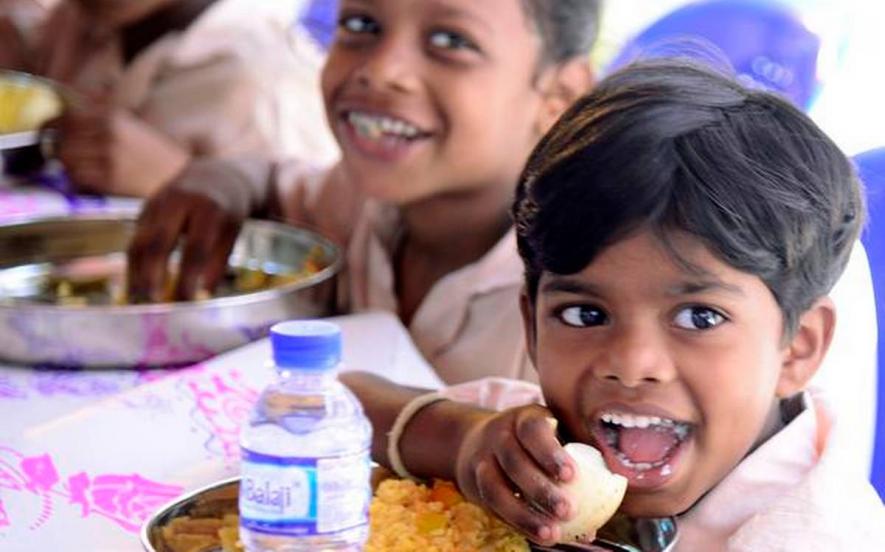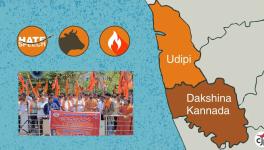Right to Food Campaign Counters Religious Opposition to Eggs in Karnataka Mid-Day Meals

Representational Image. Image Courtesy: The Hindu
The Right to Food Campaign (RTFC) has criticised the All India Vegetarians Federation (AIVF) and Lingayat and Jain leaders for their opposition to the addition of eggs to the Mid-Day Meal Scheme (MDMS) in Karnataka purely for religious reasons.
On November 23, Karnataka, considering the serious malnutrition among children, announced that eggs would be provided thrice a week to students in the districts of Bidar, Raichur, Kalaburagi, Yadgir, Koppal, Ballari and Vijayapura.
While the move was welcomed by activists and nutritionists, who insisted that eggs should be served five days a week in all the districts, the AIVF—comprising several leaders and swamis from various vegetarian religions—announced to launch a Suvarna Vidhan Soudha Chalo agitation on Monday in Belagavi against the state government’s decision.
Several seers and leaders from noted mutts of Lingayats, Jains and Brahmins urged the government in a joint press conference in Belagavi to revoke the decision in the larger interests of lakhs of students who belong to vegetarian religions.
Opposing the AIVF and the religious leaders, the RTFC demanded that the Karnataka government, as well as other states, base their nutritional intervention for children on sound scientific premise rather than religion, caste or ideology. “Scientific basis of nutrition intervention will also send out an important message to children and communities about healthy eating and nutrient-dense foods,” the RTFC said in a statement.
Eggs can also help meet the objectives of the National Food Security Act, 2013, as each 60 gramme egg can provide almost half of the protein requirement of each meal (12-20 gramme of good-quality protein) as well as many other essential nutrients.
“Eggs have to be offered to all children as part of the Mid-Day Meal Scheme in government/government-aided schools as well as Anganwadis with alternatives like an additional glass of milk, a bowl of curd or a fruit offered to those children who cannot eat eggs,” the RTFC added.
As per the National Institute of Nutrition, eggs should be provided as part of mid-day meals five days a week owing to their numerous nutritional benefits. Karnataka has been the only south Indian state that didn’t provide eggs as part of the MDMS in spite of 94% of students in the government and government-aided schools belonging to communities that eat eggs.
According to the National Family Health Survey (NFHS)-4 (2015-16), at least, 83% of the state’s population does not have any cultural or religious objections to consuming eggs. States like Tamil Nadu and Andhra Pradesh with budgets comparable to Karnataka provide eggs to students five times a week.
According to NFHS-5 (2019-21), most children in Karnataka do not reach their ideal height and weight—35.4% of them are stunted and 32.9% are underweight even before enrolling at school with the problem more prevalent in vulnerable communities.
Expressing concern that these “indicators would have worsened considerably due to the pandemic and the lockdown”, the RTFC said: “One must recognise that the problem is not just the absence of eggs from the menu at schools and Anganwadis. The menu lacks diversity in the form of milk, dairy, vegetables, fats/oils, pulses and legumes in many of the states.”
Stressing that nutritional deficiency, stunting, underweight and other kinds of health issues are “higher among children of marginalised communities, the RTFC said: “Eggs in these scenarios can tilt the nutritional status of a child and would help gain essential nutrients in fighting malnutrition and ill-health conditions.”
Eggs fulfil many of the nutritional needs, including good-quality proteins, minerals, vitamins and fats. They are easy to cook, not prone to adulteration and pilferage like other foods and contribute to increasing school attendance.
The statement highlighted that education and child health simultaneously play a crucial role in poverty reduction and economic development. Mid-day meals are important means of improving school participation while fostering, learning and supplementing the inadequate diets of school-age children.
The RTFC has urged the government to urgently take certain measures, including the provision of eggs five days a week and daily provision of milk or milk powder to schoolchildren. It also urged the government to make extra efforts to ensure that children in tribal belts, of Dalit communities and Other Backward Classes are not left out.
Get the latest reports & analysis with people's perspective on Protests, movements & deep analytical videos, discussions of the current affairs in your Telegram app. Subscribe to NewsClick's Telegram channel & get Real-Time updates on stories, as they get published on our website.
























